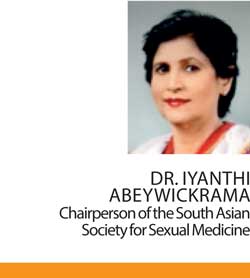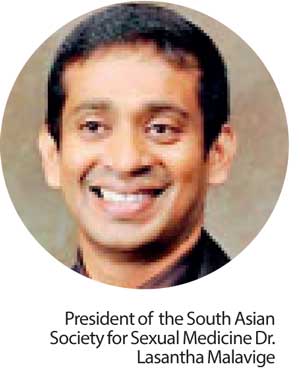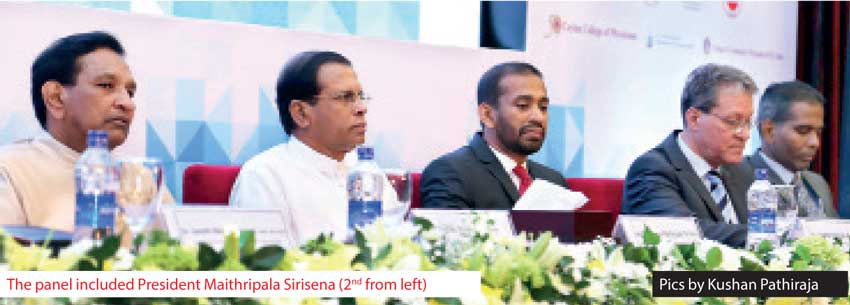08 Dec 2017 - {{hitsCtrl.values.hits}}

 Sex, sexuality and sexual disorders have been seldom discussed topics in Asia. Such stigma has given rise to many people refraining from obtaining medical advice in the subject of sexual medicine. In an attempt to break these mythical and social barriers, the South Asian Society for Sexual Medicine (SASSM) held its third Biennial Meeting recently. The event was held under the theme ‘New Frontiers in Sexual Medicine’ where several experts voiced their concerns. SASSM invited many experts from around the world to address and discuss the most recent information, controversies and how the future would take shape regarding
Sex, sexuality and sexual disorders have been seldom discussed topics in Asia. Such stigma has given rise to many people refraining from obtaining medical advice in the subject of sexual medicine. In an attempt to break these mythical and social barriers, the South Asian Society for Sexual Medicine (SASSM) held its third Biennial Meeting recently. The event was held under the theme ‘New Frontiers in Sexual Medicine’ where several experts voiced their concerns. SASSM invited many experts from around the world to address and discuss the most recent information, controversies and how the future would take shape regarding
sexual medicine.
“Sexuality and sexual problems aren’t openly discussed in Asian countries” says Dr. Iyanthi Abeywickrama
Chairperson of the committee Dr. Iyanthi Abeywickrama said that SASSM 2017 is an opportunity for local medical professionals to upgrade their knowledge on sexual medicine. “Researchers will present knowledge gained from recent advancements and research on sexual medicine. The forum also provided the delegates an opportunity to network with other professionals in the field. Sessions on surgery and psychological interventions for sexual dysfunctions were conducted. Other items on the agenda included plenary sessions, debates, abstract driven sessions and other discussions on human sexual reproductive functions. Sexuality and sexual problems aren’t openly discussed in our part of the world due to cultural and other reasons,” Dr. Abeywickrama said.
 “Limited number of professionals available” says Dr. Lasantha Malavige
“Limited number of professionals available” says Dr. Lasantha Malavige
SASSM 2017 welcomed its newly appointed President Dr. Lasantha Malavige who shed light on certain key issues that are seldom discussed in the field of sexual medicine. Airing his views Dr. Malavige pointed out that both men and women in Sri Lanka and the rest of the South Asian regions, who have sexual problems suffer in silence. “In our societies, sexual problems that we hear of are just the tip of the iceberg. Even this proportion of men and women don’t seek help because of stigma. Depression, attempted suicide, drug abuse, alcohol abuse, shattered home fronts and even gender-based violence could be precursors to deterred sexual health. When such problems arise, they meet lawyers instead of meeting medical professionals. People in Sri Lanka and the rest of the South Asian region don’t seek help and even when they do there are a limited number of professionals available to assist them. Therefore, there’s a huge vacuum in the healthcare sector which adds to the magnitude of the problem,” said Dr. Malavige.
Moderate alcohol intake may not be harmful for sexual functions, but once someone becomes addicted to alcohol, they may face various consequences. Alcohol abuse is a major challenge for the health sector in Sri Lanka and India
According to Dr. Malavige, there are many challenges that Sri Lanka and the rest of the South Asian countries face which are connected with sexual medicine. Three main challenges that directly or indirectly affect sexual health were identified. These are:
Inactive lifestyles and alcohol consumption
“Change in lifestyles has a direct impact on sexual health,” said Dr. Malavige stressing on how people engaged in farming back in the day. “12000 years ago people engaged in farming which was 50 times more efficient than hunting and searching for food. The industrial revolution then brought about more changes in lifestyles. With mechanization of industries, vehicles to move around and mechanization of day-to-day activities, people had to adjust to this drastic change. As a result people spend fewer calories during their day-to-day activities and also during work. Despite this reduction of physical activities, our genetic composition hasn’t changed much over the past few years. To make things worse we are now exposed to more refined and palatable food items which cause a mismatch between the calorie intake and consumption. This makes us vulnerable to conditions such as obesity, diabetes, hyperlipidemia, hypertension and other conditions. All these are risk factors for poor sexual functions and cardiovascular health for both men and women. This change in lifestyle is especially relevant to people in Sri Lanka and South East Asia because we have a four times higher risk of developing diabetes when compared to Caucasians,” explained Dr. Malavige.
He further stated that South Asians have a tendency to develop diabetes at a much younger age. Doctors working in different areas should advice people to engage in active lifestyles. Teenagers could be encouraged to be physically active, so that they wouldn’t develop conditions such as diabetes and obesity. A sedentary lifestyle has the potential to destroy their sexual life at a very early age. We need new legislation to promote healthy eating and healthy food habits. Refined foods are good sources of ‘poison’.
Speaking about alcohol and sexual functions, Dr. Malavige pointed out some ‘interesting’ associations between the two factors. “500 years ago Shakespeare accurately described how alcohol increases sexual desire, but reduces sexual performance. Moderate alcohol intake may not be harmful for sexual functions, but once someone becomes addicted to alcohol, they may face various consequences. Alcohol abuse is a major challenge for the health sector in Sri Lanka and India. Alcohol consumption should be discouraged at national level. Sri Lanka has done really well in controlling smoking. Sleep is an important lifestyle factor that we all need. In terms of sex, lack of sleep can indirectly affect erectile dysfunction in men and sexual arousal in women. According to research it has been proven that irregular sleep patterns are linked to diabetes and mortality. It is easy to prescribe medicine, but lifestyle modifications could be far more challenging,”he said.
Unfortunately, the number of people addicted to Internet too is growing. Internet addiction can have a direct impact on the addict’s family and his relationships. Large number of addicts isolate themselves from real life situations
 Cyber-sex and addiction to technology and internet
Cyber-sex and addiction to technology and internet
Internet and technology is rapidly advancing and people are getting more addicted to these devices. According to Dr. Malavige, the Internet brings about addictive changes and pseudo-intimate personal relationships. “Unfortunately, the number of people addicted to Internet too is growing. Internet addiction can have a direct impact on the addict’s family and his relationships. Large number of addicts isolate themselves from real life situations. They meet online, but once they meet they don’t have that intimacy. Cyber-sex could lead to divorce and far more adverse consequences. Individuals who seek sexual partners online have a higher risk of contracting sexually-transmitted diseases,”he warned.
Lack of knowledge and socio-cultural myths
“The third challenge lies in the lack of knowledge, socio-cultural myths regarding sexuality,” said Dr. Malavige. “Colonial attitudes have hugely dominated our societies even after 69 years of Independence. But the West has moved on. Too much negativity towards sexuality, expressions of sexual feelings and enjoyment has left many men and women not having satisfying sex lives. Sex education in schools too is inadequate. In my opinion, age-appropriate sex education has become an urgent need in Sri Lanka and the South Asian region. The younger generation has never been taught what they should know about sexuality, importance of healthy sexual relationships and how to maintain a healthy sex life. There’s much that has to be done in these areas and therefore SASSM will take these challenges seriously and we’ll work with different stakeholders to reach this goal,” he said.
500 years ago Shakespeare accurately described how alcohol increases sexual desire, but reduces sexual performance

Common sexual disorders
According to the Diagnostic Statistical Manual, some common sexual disorders include :
23 Dec 2024 42 minute ago
23 Dec 2024 51 minute ago
23 Dec 2024 1 hours ago
23 Dec 2024 2 hours ago
23 Dec 2024 3 hours ago